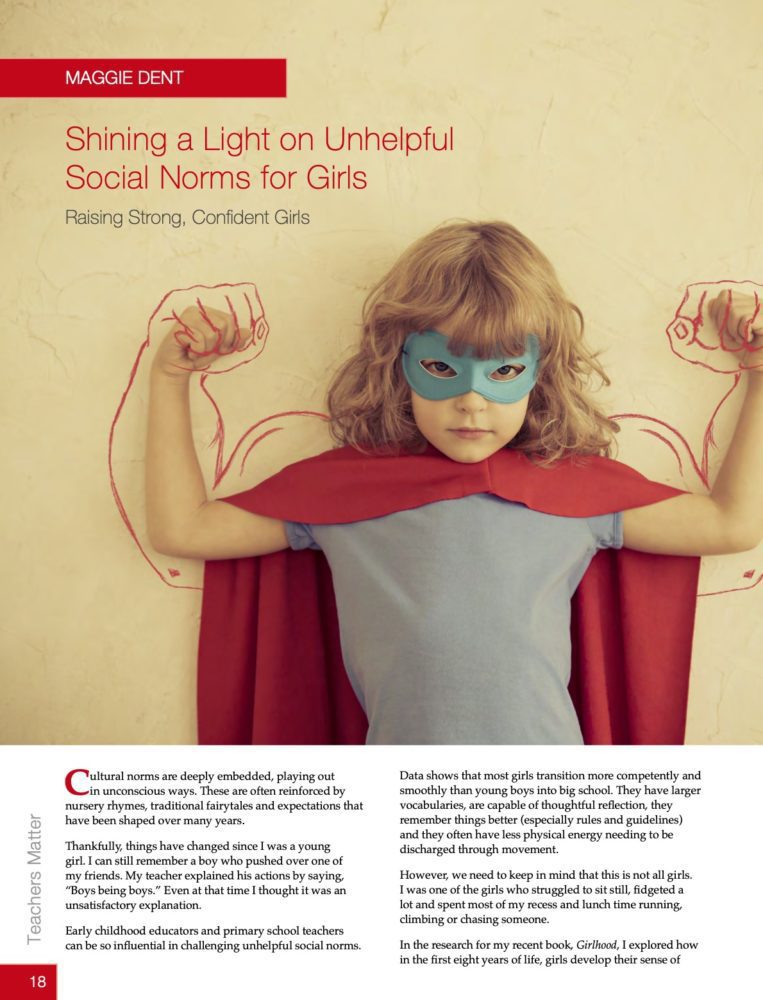Maggie in the Media, Teachers Matter
Shining a Light on Unhelpful Social Norms for Girls in our Schools.

“This article originally appeared in Teachers Matter magazine. Click here to view the article as a PDF. You can also subscribe to Teachers Matter here.
*********
Cultural norms are deeply embedded, playing out in unconscious ways. These are often reinforced by nursery rhymes, traditional fairytales and expectations that have been shaped over many years.
Thankfully, things have changed since I was a young girl. I can still remember a teacher explaining why a boy who pushed over one of my friends, saying ‘boys being boys.’ Even at the time I thought it was an unsatisfactory explanation.
Early childhood educators and primary school teachers can be so influential in challenging unhelpful social norms. Data shows that most girls transition more competently and smoothly than young boys into big school. They have larger vocabularies, are capable of thoughtful reflection, they remember things better (especially rules and guidelines), and they often have less physical energy needing to be discharged through movement.
However, we need to keep in mind that this is not all girls. I was one of the girls who struggled to sit still, fidgeted a lot and spent most of my recess and lunch time running, climbing or chasing someone.
In the research for my recent book Girlhood, I explored how in the first eight years of life girls develop their sense of identity, their sense of self, 90% of their brain, their social and emotional awareness, their belief systems and their mind.
They are watching those around them intently and modelling is a huge part of how they shape their sense of who they really are. When we speak to little girls as though they are less capable, less brave and somehow weaker than our male students, we are shaping their future resilience to deal with hard things.
Given how long they spend in early childhood settings and classrooms, the influence that educators have over shaping the core foundation of all of our children is enormous.
Girls learn very early that they are in a lifelong competition, especially against other girls. The tendency to compare and despair starts young but we can help them to embrace their own individuality with its strengths and challenges.
They are meant to be themselves, not as the marketing world would have them believe they are – focusing excessively on appearance. Please be careful how you greet girls, so that they don’t come to believe that their appearance is what is most important.
As educators and teachers we can teach girls about their capacity to be persistent, to strive to overcome challenges whether that be in learning, in friendships or in play. Girls learn early how to please others and becoming a people pleaser often comes at the cost of taking care of themselves. Encourage them to have their own voice and create opportunities for them to be heard, especially the quiet girls.
Girls can struggle with their emotional world and research shows that any significant negative event that causes strong emotions can come back later in life and cause more angst. They tend to remember everything, especially the moments where they felt let down, excluded, disrespected or ignored. Nurturing their inner world with plenty of awe and wonder in nature, with lots of creative and imaginative play and lots of time to laugh and be a bit ridiculous will help them right through life because it gives them other memories to remember, not just the painful ones.
When girls are not given the same opportunities as boys to take risks and to stretch themselves physically and mentally, they can struggle with having confidence after eight years of age. Indeed, the research shows that girls’ self-esteem after eight tends to plummet while boys’ seems to stay the same.
As girls tend to be more worried about pleasing their parents and not disappointing them, they often struggle even more when they fail at something or make a mistake. They don’t just let themselves down, they feel they have let their parents down. When educators and teachers can be enthusiastic about how mistakes can help you learn and grow, and give them lots of opportunities to lose and fail, you can help them navigate setbacks and disappointments, especially in the adolescent years. Emotional buoyancy, especially around things like disappointment, can only be learnt through experience.
Finally, the last area that educators and teachers can help our girls to grow to be confident, capable and resilient is to enable them to become their own problem solvers and creative thinkers. There are so many classroom activities that give our girls, indeed all children, opportunities to think for themselves and work out creative solutions to common problems.
Girls benefit enormously from having a strong early foundation for their minds, bodies, hearts and spirits, and teachers and educators have such an enormous role to play in this space. As we challenge unhelpful social norms, we can then challenge the blue and pink haze so that girls can grow up to be capable, happy, healthy and heard; being who they really are – a, one-off miracle.
Maggie Dent has become one of Australia’s favourite parenting authors and educators. She has a particular interest in the early years, adolescence and resilience. Maggie hosts the ABC podcast, Parental As Anything and recently released her first book about girls, Girlhood: Raising our little girls to be healthy, happy and heard.
www.maggiedent.com



